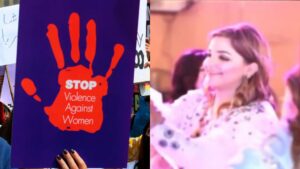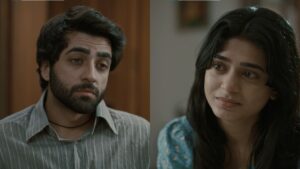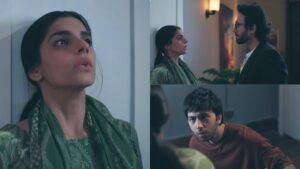‘Meem Se Mohabbat’ aired this week and fans were overjoyed to find out that with a somewhat clever twist, Roshi and Talha are finally married. Previously, fans were nervous about Roshi was going to resign to her fate and marry the misogynist Shariq who was planning to take revenge against her for his termination from Talha’s company. But although our main leads are set to enter into their married life era, we have to discuss why the way their nikkah was executed was super problematic and how employing the ‘honour rescue’ trope only sends the message that women are damsels in distress who still need men to save their izzat from being destructed.

What exactly is the ‘honour rescue trope’? It’s a common theme in Pakistani dramas where during a wedding the bride is jilted by her groom in the last moment, and the family fears that this could damage the bride’s honour as well as the family’s izzat in front of their extended relatives and friends. So when the male family figure starts feigning about passing away from a heart attack, the family’s quick solution is to pick out the closest bachelor present within the crowd and quickly marry him off to the bride so that the day is saved.
In episode 29 of ‘Meem Se Mohabbat’ the family finds out that Shariq is missing in the last minute and his family has no idea about his whereabouts. The grandfather begins to complain of heart palpitations and dizziness as he fears that Roshi’s izzat will face a devastating blow if her to-be groom doesn’t show up. When its close to midnight and its clear that Shariq is not showing up and Roshi will be humiliated in front of the guests, Talha steps up in a heroic way to marry her and the family thanks him endlessly for saving their ‘izzat’. In episode 30 we find out that this was all part of Talha’s plan to save Roshi from making a bad decision and regretting it for the rest of her life, as one of his employees overhears Shariq in a salon about the many ways he will take revenge on her for complaining about his sexual harassment and getting him fired from his job. So he concocts a scheme to kidnap Shariq and thrash him away in a hidden area so that Talha could step up at the wedding and marry Roshi in his place.
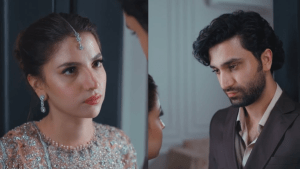
People might think that we’re going overboard with this take but the ‘honour rescue’ trope is deeply problematic because it still reinforces the idea that it is in a man’s power to rob a woman of her honour or to save it. It still emphasises that a woman is incapable of making her own choice to marry- and in order to save her family’s respect and prevent her grandfather from dying from a heart attack she must quickly marry the first bachelor who steps up, despite the fact that their relationship is deeply unbalanced. We know that audiences might not find such an issue with Talha’s actions because he ‘saved’ Roshi from marrying a horrible man who would have destroyed her life, but why didn’t the female lead get a chance to express her opinion about whether she wanted to marry Talha or not? Why didn’t Talha inform her about what he overheard Shariq telling his friend and allow her to decide her fate from that point? How does this move make it okay that Roshi is now a step mother to a child even though she’s only 20 years old?
Preivously, users expressed their disappointment in how the show kept sweeping away the glaring age gap between the two leads under the carpet but it is shoved in our face every single time Talha steps in to save Roshi from an accident like when she passed out at a party where Shariq had taken her. The nikkah in episode 29 only proves why their relationship is toxic because the female lead had no agency to decide whether she wanted to marry Talha or not. Many social media users pointed out that Roshi was a 20 year old with no university degree or career experience, and Talha was more of a mentor to her than a potential husband because throughout the show he kept lecturing her about life and her career, as Roshi had no dreams or ambitions of her own aside from getting married.
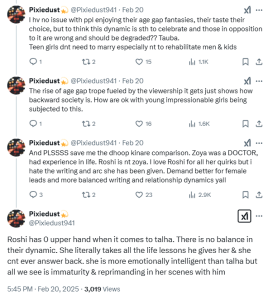
Read more:
Talha and Roshi in ‘Meem Se Mohabbat’: Does age gap matter in a relationship or is it just a social construct?
‘Meem Se Mohabbat’ isn’t an anomaly but time and time again we have seen Pakistani dramas utilise this trope as a way to redeem the hero because he saved the heroine’s izzat in the last minute. In 2024 the drama ‘Mujhay Pyaar Hua Tha’ starring Hania Aamir and Wahaj Ali featured this trope when Meerab’s to be groom doesn’t show up at the last minute, her cousin Saad steps up to quickly marry her and save the father’s honour in front of the guests. When we had known all along that Meerab did not love Saad and actually wanted to marry Areeb but she’s pushed into quickly accepting Saad as her husband so that her father doesn’t die from a heart attack. Because honestly there’s nothing more horrible than a woman being jilted by her groom on the day of her wedding, not even pressuring her to marry someone she doesn’t like.
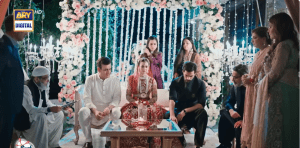
Another drama that utilised this trope was the 2021 comedy ‘Chupke Chupke’ which once thought that the perfect way to bring two opposite personalities in marriage together is through the ‘honour rescue’ trope. When Meenu (starring Ayeza Khan) is jilted on the day of her wedding when her to-be groom is revealed to be previously married and also has a child, her family quickly scrambles around to pressure her older cousin Faaz (played by Osman Khalid Butt) into marrying her in order to prevent her from being publicly humiliated.
We have to shake our heads that even still in 2025, drama writers are obsessed with a woman’s honour and their consistent need to reinforce the idea that women need a man in their life to protect their honour and the family’s izzat. Especially doing this in a country where already women are denied agency in making decisions about their education, career or even whom they wish to marry, we’re now telling them that its okay for a naive, inexperienced 20 year old with no ambitions to marry an older man who has a son?
It’s funny that there have been some incredibly good dramas released in these few years like ‘Ishq Murshid’ or ‘Fairy Tale’ which actually proved that you can write good male leads who respect a woman’s agency and her world view without demeaning her for being ‘childish’ or ‘naive’, but tropes like the honour rescue still exist to dismantle the smallest progress our industry keeps making.




